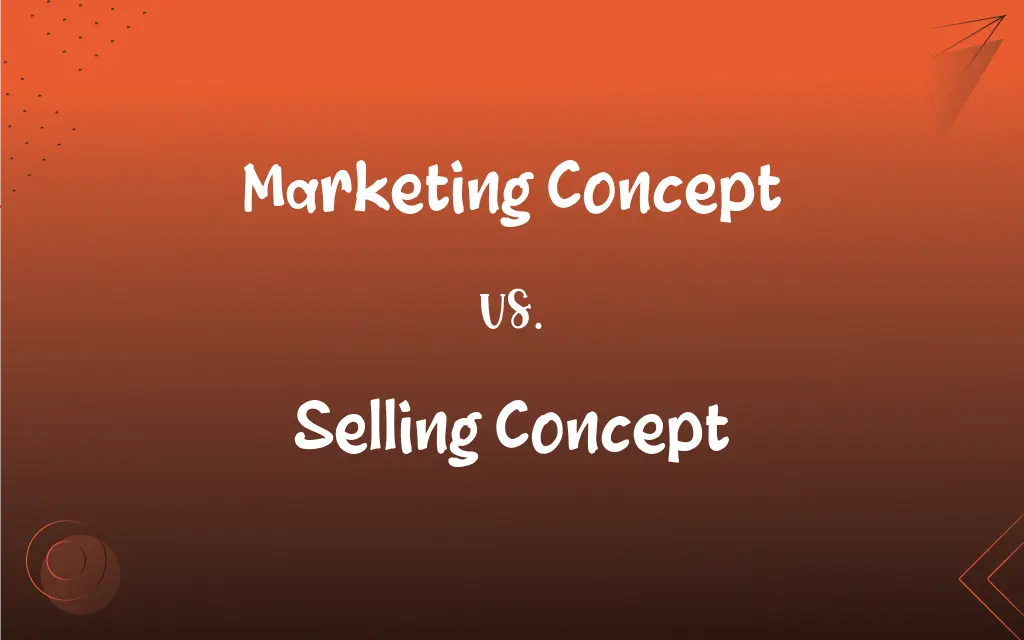Marketing Concept vs. Selling Concept: What's the Difference?
Edited by Janet White || By Harlon Moss || Updated on October 4, 2023
The Marketing Concept focuses on fulfilling customer needs, while the Selling Concept emphasizes aggressive sales techniques to push products.

Key Differences
The Marketing Concept is rooted in understanding and meeting the needs and desires of consumers. In contrast, the Selling Concept is driven primarily by the objective of making a sale, often without considering the actual needs of the buyer.
Under the Marketing Concept, companies believe that success is achieved by offering products or services that consumers genuinely want or need. On the other hand, the Selling Concept assumes that consumers won't buy enough of a product without a strong sales push.
The Marketing Concept revolves around delivering value and building lasting relationships with customers, making it a long-term business strategy. The Selling Concept, by contrast, is more short-term and transactional, focusing on just moving inventory.
Companies that adhere to the Marketing Concept prioritize market research, consumer feedback, and product innovation. Those aligned with the Selling Concept might prioritize sales promotions, advertising, and high-pressure sales tactics.
While the Marketing Concept looks to create a pull strategy, attracting customers to products, the Selling Concept employs a push strategy, trying to push products onto consumers irrespective of their actual needs or desires.
ADVERTISEMENT
Comparison Chart
Primary Focus
Meeting consumer needs
Aggressive sales tactics
Business Strategy
Long-term relationship building
Short-term and transactional
Approach
Pull strategy (attracting customers)
Push strategy (forcing products onto customers)
Research Emphasis
High (understands market needs)
Low (focuses more on how to sell)
Success Metrics
Customer satisfaction and loyalty
Volume of sales and immediate revenue
ADVERTISEMENT
Marketing Concept and Selling Concept Definitions
Marketing Concept
Prioritizes market research and consumer feedback.
Through the Marketing Concept, Company C revamped its product line based on user reviews.
Selling Concept
Focuses on aggressive sales techniques.
Company F, driven by the Selling Concept, often had pushy sales campaigns to clear old stock.
Marketing Concept
A strategy focusing on delivering value to ensure customer loyalty.
The Marketing Concept led Company B to offer extensive post-purchase support.
Selling Concept
Targets short-term sales and immediate revenue.
Company I, following the Selling Concept, frequently launched limited-time promotions.
Marketing Concept
Believes in attracting customers by offering desired products.
Using the Marketing Concept, Company E successfully launched a product line tailored for remote workers.
Selling Concept
Operates on the belief that consumers need persuasion to buy.
Under the Selling Concept, Company H invested heavily in advertisements rather than product innovation.
Marketing Concept
Aims for long-term business growth by fulfilling customer needs.
Company D's dedication to the Marketing Concept has earned it a loyal customer base over the decades.
Selling Concept
Often overlooks market research in favor of sales promotions.
Company J's adherence to the Selling Concept resulted in products that were out of touch with current market trends.
Marketing Concept
An approach centered on consumer needs and desires.
By following the Marketing Concept, Company A introduced eco-friendly products in response to rising environmental concerns.
Selling Concept
Emphasizes pushing products to consumers.
Company G's reliance on the Selling Concept led to high sales but many returns.
FAQs
Why might a company adopt the Selling Concept?
A company might adopt the Selling Concept to achieve immediate sales and revenue.
How does the Selling Concept approach sales?
The Selling Concept uses aggressive sales tactics to push products.
What is the main goal of the Marketing Concept?
The Marketing Concept aims to fulfill customer needs and desires.
Does the Marketing Concept prioritize short-term or long-term strategies?
The Marketing Concept emphasizes long-term strategies and relationship building.
Are there modern evolutions of these concepts with the rise of data analytics and AI?
Yes, data analytics and AI are enhancing the Marketing Concept by providing deeper insights into consumer behavior, enabling more personalized and targeted marketing strategies.
Is consumer feedback more vital in the Marketing Concept or Selling Concept?
Consumer feedback is more central to the Marketing Concept.
How do businesses under the Selling Concept view consumers?
Under the Selling Concept, businesses often believe consumers need strong persuasion to buy.
Is market research crucial for the Selling Concept?
The Selling Concept often overlooks deep market research in favor of direct sales techniques.
Which concept, Marketing or Selling, is more sustainable in the long run?
The Marketing Concept, emphasizing customer needs and long-term relationships, is generally considered more sustainable.
Is the Selling Concept always a poor strategy?
Not necessarily. In certain scenarios, like clearing out old inventory or limited-time offers, the Selling Concept can be effective.
Does the Selling Concept prioritize post-sales services?
Generally, the Selling Concept is more transactional, so post-sales services might not be its primary focus.
How might a shift from the Selling Concept to the Marketing Concept affect a company's brand image?
Shifting to the Marketing Concept can improve a company's brand image as it shows commitment to understanding and addressing customer needs.
How do businesses under the Marketing Concept measure success?
Businesses following the Marketing Concept often measure success through customer satisfaction, loyalty, and long-term profitability.
Can a company combine both the Marketing and Selling Concepts?
Yes, a company can use elements of both, but they are fundamentally different in approach.
Which concept focuses more on product innovation?
The Marketing Concept prioritizes product innovation based on market needs.
How might the Selling Concept impact customer trust?
Over-reliance on the Selling Concept can erode customer trust due to aggressive sales tactics.
In which industries might the Selling Concept be more prevalent?
The Selling Concept might be more prevalent in industries with short product life cycles or perishable goods.
How does the Marketing Concept approach advertising compared to the Selling Concept?
While the Marketing Concept emphasizes advertising that educates and resonates with consumers, the Selling Concept often focuses on hard-selling and promotional tactics.
Can the Selling Concept lead to customer dissatisfaction?
Yes, if products sold aggressively don't meet customer expectations, it can lead to dissatisfaction and returns.
How do digital marketing and e-commerce fit into the Marketing Concept?
Digital marketing and e-commerce can facilitate the Marketing Concept by offering personalized content and recommendations based on user behavior and preferences.
About Author
Written by
Harlon MossHarlon is a seasoned quality moderator and accomplished content writer for Difference Wiki. An alumnus of the prestigious University of California, he earned his degree in Computer Science. Leveraging his academic background, Harlon brings a meticulous and informed perspective to his work, ensuring content accuracy and excellence.
Edited by
Janet WhiteJanet White has been an esteemed writer and blogger for Difference Wiki. Holding a Master's degree in Science and Medical Journalism from the prestigious Boston University, she has consistently demonstrated her expertise and passion for her field. When she's not immersed in her work, Janet relishes her time exercising, delving into a good book, and cherishing moments with friends and family.































































